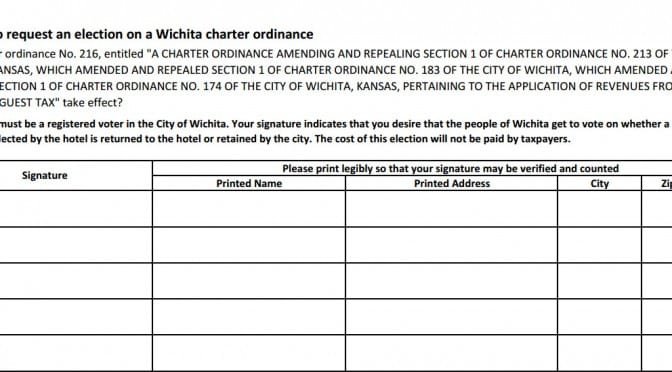Tag: Carl Brewer
-

Despite growth of sharing economy, Wichita relies on centralization
The sharing economy provides for the decentralization and privatization of regulation, but the City of Wichita clings to the old ways.
-

In Wichita, open records relief may be on the way
A new law in Kansas may provide opportunities for better enforcement of the Kansas Open Records Act.
-

In Wichita, bad governmental behavior excused
A Wichita newspaper op-ed is either ignorant of, or decides to forgive and excuse, bad behavior in Wichita government, particularly by then-mayoral candidate Jeff Longwell.
-

WichitaLiberty.TV: Kansas revenue and spending, initiative and referendum, and rebuliding liberty
The Kansas Legislature appears ready to raise taxes instead of reforming spending. Wichita voters have used initiative and referendum, but voters can’t use it at the state level. A look at a new book “By the People: Rebuilding Liberty Without Permission.”
-

Wichita economic development policies questioned
The City of Wichita asks for citizens to trust that it has policies in place that will be followed.
-

Wichita has examples of initiative and referendum
Citizens in Wichita have been busy exercising their rights of initiative and referendum at the municipal level. The Kansas Legislature should grant the same rights to citizens at the state level.
-
Downtown Wichita deal shows some of the problems with the Wichita economy
In this script from a recent episode of WichitaLiberty.TV: A look at the Wichita city council’s action regarding a downtown Wichita development project and how it is harmful to Wichita taxpayers and the economy.
-

WichitaLiberty.TV: A downtown Wichita deal shows some of the problems with the Wichita economy
In this episode of WichitaLiberty.TV: We’ll examine the city council’s action regarding a downtown Wichita development project and how it is harmful to Wichita taxpayers and the economy.
-

Exchange Place incentives, including free sales tax and an ethics bypass
A downtown Wichita project receives free sales taxes and a bypass of Wichita’s code of conduct for city council members.
-
How TIF routes taxpayer-funded benefits to Wichita’s political players
In Wichita, tax increment financing (TIF) leads to taxpayer-funded waste that benefits those with political connections at city hall.
-

WichitaLiberty.TV: Mayor Carl Brewer’s State of the City address, and the Libertarian Mind
In this episode of WichitaLiberty.TV: We’ll take a look at a few things Wichita Mayor Carl Brewer told the city in his recent State of the City Address. Then a look at topics from a new book titled “The Libertarian Mind: A Manifesto for Freedom.”
-
Blubaugh, Mayor vote for licenses for undocumented workers to drive to their illegal jobs
The Wichita city council voted to recommend that the Kansas Legislature create drivers permits for undocumented workers so they could drive to their jobs.